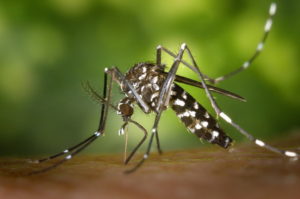 As the number of Zika virus infections continues to rise in the US, it is important to take the right steps in order to minimize your risk of contracting the disease.
As the number of Zika virus infections continues to rise in the US, it is important to take the right steps in order to minimize your risk of contracting the disease.
Travel Smart
Pregnant women and women planning on becoming pregnant should avoid traveling to Zika affected areas. This includes Florida, Puerto Rico, and the US Virgin Islands. Outside of the US this also includes Mexico, Central America, the Caribbean and most of South America.
Wear Mosquito Repellent
The Center for Disease Control recommends mosquito repellent products with the active ingredients DEET, oil of lemon eucalyptus, picaridin, or IR 3535. DEET is safe for pregnant women to use. Don’t forget to spray the feet and ankles as the Zika carrying mosquitos have a preference for these areas.
Wear Protective Clothing
Wear dark colored long sleeves and long pants including shoes with full coverage. You can get extra protection by wearing clothing that contains permethrin, a synthetic insecticide which is safe for pregnant women and children to use.
Remove Standing Water
Aedes mosquitoes that spread Zika feed during the morning into the afternoon and like to go inside houses for shade and reproduction. Any water located in your home could be a breeding ground for mosquitos. One tablespoon of water can serve as a breeding ground and produce up to 300 mosquitos. Be sure to get rid of any standing water in or around your home including in flower and plant pots, garbage, buckets, and any item that holds water.
Exercise Inside
Aedes mosquitoes are drawn to carbon dioxide, heat, and sweat. It’s best to switch your morning run into an indoor workout, especially in Zika affected areas and when it’s warm out. Blast the AC when you’re inside to keep those mosquitoes out.

 ince the World Health Organization declared the Zika virus outbreak a public health emergency, there has been a lot of international concern. This summer, Rio de Janeiro in Brazil is hosting the Summer Olympics, but unfortunately, Rio lies in a Zika virus-affected area. Some Rio officials
ince the World Health Organization declared the Zika virus outbreak a public health emergency, there has been a lot of international concern. This summer, Rio de Janeiro in Brazil is hosting the Summer Olympics, but unfortunately, Rio lies in a Zika virus-affected area. Some Rio officials